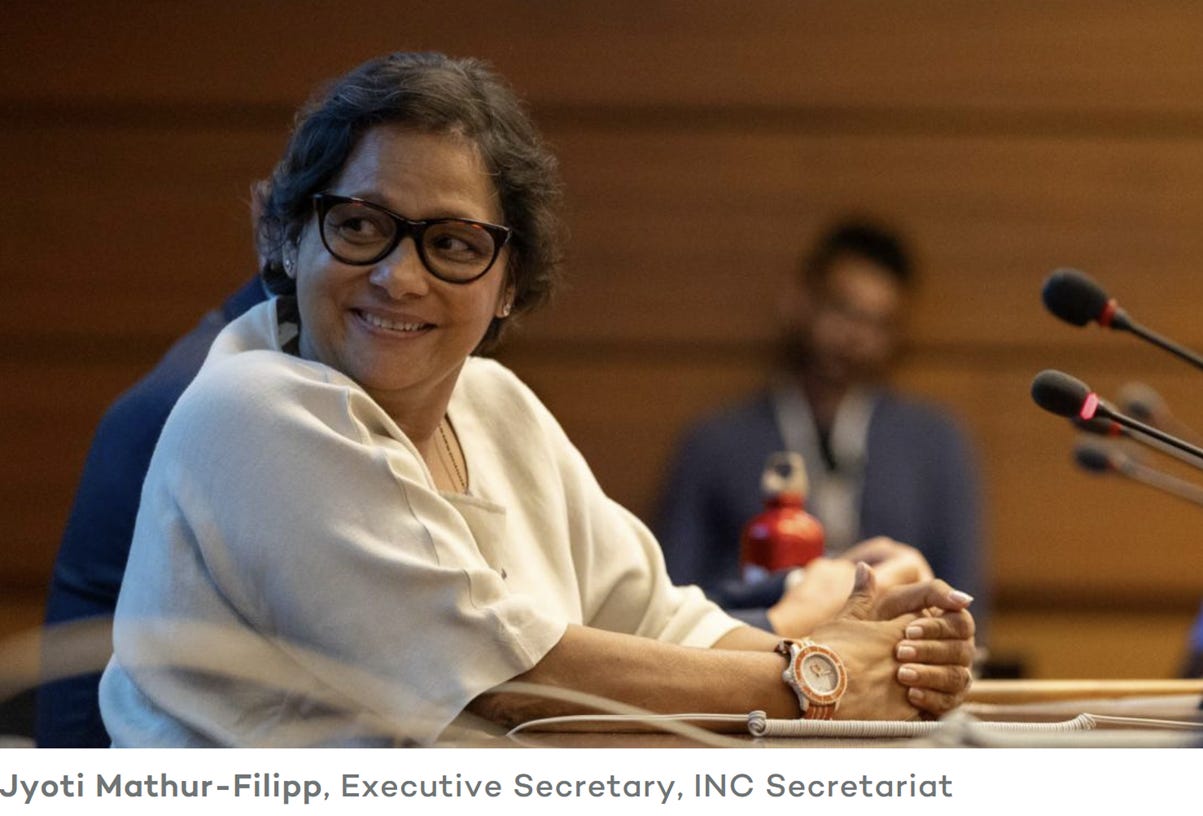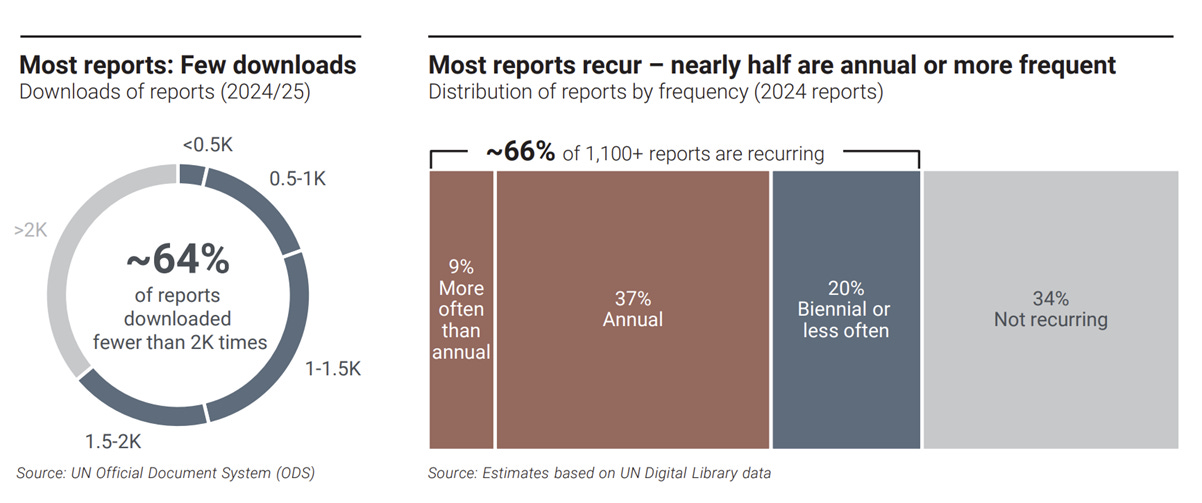The UN Talking Shop That Could Not Clean Up Plastic Waste
Why the UN COPs, Forums, INCs, Never-Ending High-Level Meetings and their Reports are not Fit for Purpose
The UNEP Plastic Pollution Intergovernmental Negotiating Committee (INC) 5.2, that had met for ten days in Geneva this month (after five other high-level intergovernmental meetings under the same mandate), failed yet again to deliver an agreement and a strategy for cleaning up plastic waste.
The 1200 activist NGOs who attended the conference blamed industry for the failure; the European Union blamed the Middle Eastern delegations; and the developing countries blamed the EU. But in the end, the blame for this recurring failure is due solely on the United Nations, that has created a perpetual, high-level intergovernmental meeting mill where successful agreements have never been an objective. These UN bodies thrive on failure (and further meetings).
The objective was supposed to be simple. Nobody wants plastic waste showing up in the ocean and the sources of this waste originates from just ten river basins. Solutions should have been very easy. Except that the UN Intergovernmental Negotiating Committee (INC) structure is so complex that a simple solution became, naturally, a difficult problem. Stakeholders who normally have little voice or policy access elsewhere piled in and pulled negotiations toward banning plastic production, restricting chemicals, tying plastics to climate change and demanding cash for developing countries (not linked to building waste management infrastructure, just cash). After six high-level meetings and thousands of pages of reports, the UN has failed, once again, to find a solution. As they plan the next meeting in 2026, plastic and other untreated waste keeps pouring out of those ten river basins.
What has the United Nations done to create such a situation of unlimited failure?
A Perpetual Process of Negotiations, COPs, INCs, Meetings, Forums and Assemblies
Don’t get me wrong. The United Nations does provide some essential services, from blue helmets keeping the peace to protecting human rights, from food aid missions in crisis-torn countries to vaccine distributions and reproductive health programs in the developing world, a lot of good gets done.
But there is another, administrative part of the UN that has grown into a diplomatic serpent. Their existence is based on a seemingly endless cycle of intergovernmental meetings, conferences, assemblies, negotiations with a global diplomatic corps that travels on a regular basis around host venues often in remote locations with poor infrastructure. Most of the events are tied to environmental health issues (climate change, tobacco control, biodiversity, chemicals…) and are led by civil society groups who have used them as foils against their national governments.
The Plastic Pollution Intergovernmental Negotiating Committee (INC) was one such example, set up in 2022, and after six meetings, it has made zero progress (except to already be planning the next meeting). There were more than 3000 delegates for the Plastic Pollution INC 5.2 (the “.2” is because it was a supplementary negotiation following the failure to reach an agreement at the INC 5 in Busan last December). Because the Busan process had become so ridiculous, The Firebreak decided to get a delegate to report a daily dispatch during the last five days. See our Sunday, Monday, Tuesday, Wednesday and Thursday dispatches.
But if they were to have reached an agreement last week in Geneva, the process would have ended (unless the UN would create a new administrative body to implement the decisions taken at these meetings). So these COPs, NICs, high-level meetings, assemblies… become perpetual processes designed to continuously move forward in its failures. A talking shop for international diplomats and NGOs who use the global prestige to attract the media as willing supplicants.
These events often become rather circus-like, with sideshows where protest groups find the stages to amplify their issues. Some events, like the UN Framework Convention on Climate Change (UNFCCC) Conference of the Parties (COP) climate summits have become very mediatic (and very climate unfriendly).
How many of these large, two-week meetings are there?
While not all events are annual, a quick scan of the negotiations site shows there are 52 UN-sponsored intergovernmental conferences or negotiations, mostly on environmental-health issues. That comes out to more than four two-week events a month, or rather, a continuous flow of UN-led intergovernmental conferences, forums, committees, negotiations...

Even the UN, in a review launched this year after their budget issues became real (with the looming departure of the United States from certain agencies), concluded that this many-headed serpent had grown out of control.
Meetings Achieving Nothing with Reports Nobody Reads
The UN realized it had a credibility problem, a resource management problem, a mission creep problem and now, with the budget cuts, a funding problem. As part of the UN80 initiative, they called for a review of their activities and the report they recently published, the Mandate Implementation Review, was stunning in its honest admission of the UN’s weakness. Examining the findings will help understand why the UN’s perpetual policy process strategy leads to continuous failures like that witnessed last week at the Plastic Pollution NIC 5.2 negotiations.
Every page of the UN report reeks of wasted time, resources and utility. If the UN were a corporation accountable to shareholders, it would have gone bankrupt long ago. Here are some observations from the UN’s Mandate Implementation Review that verify the urgent need for change:
There are over 240 intergovernmental bodies, including committees and other forums managed by the UN.
Over 30% of the resolutions under discussion since 1990 have not changed or evolved.
“… about one in five annually recurring agenda items or sub-items did not result in any resolution or decision last year.”
“Since 2010, more than half of the General Assembly resolutions adopted on recurring subjects were either extremely or very textually similar to previous versions.”
“… more than 85 per cent of active mandates lack instructions on review or termination.” Every year these UN officials come back for more meetings and reports and, with no sunset clauses, they become perpetual.
In 2024, the UN facilitated 27,000 meetings with UN secretariat direct costs of more than $360 million.
And then there are the reports (see image). 64% of the 1,100 UN reports produced in 2024 have been downloaded less than 2000 times.
At the August 8, 2025 press conference on the publication of this review, U.N. Secretary-General Antonio Guterres was quoted in an article:
Last year, the U.N. system supported about 27,000 meetings involving 240 bodies, producing some 1,100 reports—an increase of 20% since 1990. “The sheer number of meetings and reports is pushing the system—and all of us—to the breaking point”… only the top 5% of U.N. reports are downloaded over 5,500 times, while one in five reports receives fewer than 1,000 downloads ... A TikTok video, for comparison, receives more views in an hour than most U.N. reports get in a year.
Add to this that every UN meeting, conference, negotiation … carries intergovernmental delegate baggage and thousands of civil society and industry interest groups and there is a certain class of professionals that feed off of the futility of global diplomacy. Most of the activist NGOs get foundation funding to attend these events on behalf of philanthropists like Michael Bloomberg who enjoy UN Ambassador status for their support.
The Plastics Pollution NIC 5.2, that ended silently in all of its anticipated failure, had at least 3000 delegates descend on Geneva for ten days at the height of tourist season. They are already planning the next big Plastic Pollution negotiating conference.
Why Does the Plastic Pollution INC Negotiation Process Continually Fail?
This isn’t rocket science. We have to reduce plastic waste from entering the environment. Nobody disagrees with that. You could gather five consultants to write up an action plan in an afternoon, email it to the world’s environment ministers and have a program funded and up and running within a couple months.
Instead the plastic waste issue became a UN mandate, got fed into the its perpetual process of conferences and negotiations, interest groups took it over and nothing was, or ever will be, done about it. But they will have a lot of lovely two-week conferences in wonderful host cities where delegates (with no real jobs or pressing agendas) can meet each other again and again.
Every UN conference or negotiation starts with a draft text (one that a team has been working on since the last event). After the failure of the Plastic Pollution INC 5 in Busan last November, a new document was prepared and circulated among a select group of insiders. The negotiations are normally intended to finalize the draft text, but in the case of the INC 5.2, the draft text was thrown out after the first week with the chair, some faceless functionary, receiving inputs for a new text he began drafting after Day 8. A successful negotiation was never an objective, but the draft text is now moving forward to INC 5.3 (or will they call it INC 6?).
The UN could not control the objectives of the Plastic Pollution negotiations – it was never in their mandate. So while improving recycling and waste management infrastructure was a logical part of the negotiations, delegates from the European Union, represented by the European Commission’s DG Environment, and supported by activist NGO delegates who had bought their way onto national delegations in the developing world, pushed for a more ambitious objective of cutting plastic production and chemicals by unrealistic targets. The UN allowed them to hijack the negotiations because success was never an objective.
The consensus approach made certain that the process would never reach an agreement.
But just imagine if the next session were to present more modest parameters within a more rational negotiating process and the delegates reached an agreement to address plastic maritime waste (but none of the other add-ons put forward by interest groups). What would happen?
The NGOs would no longer have a biannual platform to run their campaigns in front of the world’s media.
The UN would have to start enforcing the use of funds for infrastructure projects in developing countries (and not just straight cash distributions).
There would be no more high-level intergovernmental meetings combined with networking and tourism opportunities for the thousands comprising the professional delegate class.
Philanthropist UN ambassadors will no longer be able to fund and influence the events from the shadows.
OK, fine, the ten river basins will stop spewing waste into the oceans, but outside of that, a resolution to the plastic pollution negotiation process would be a terrible thing. Rest assured, unless the UN radically changes, this scenario will never happen.



